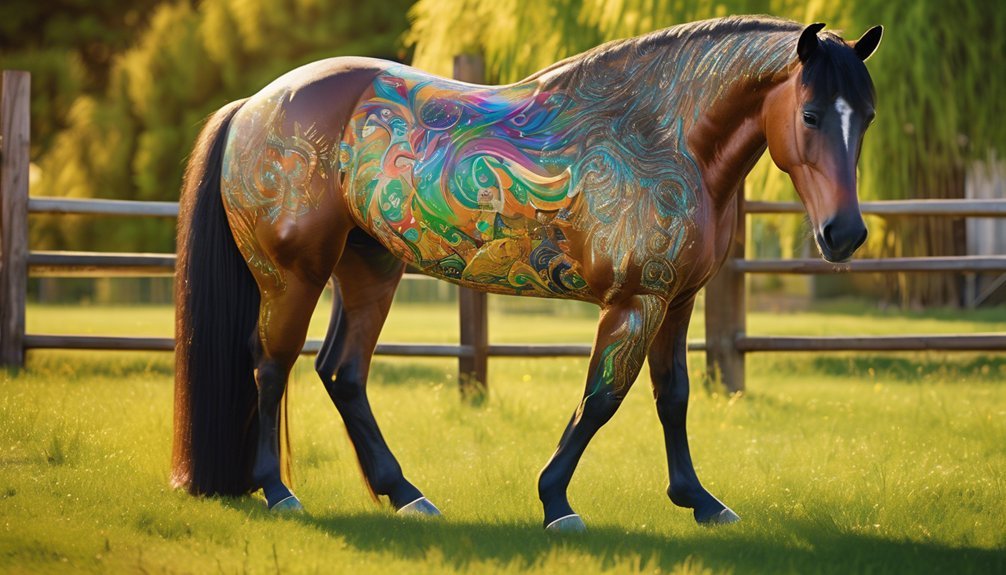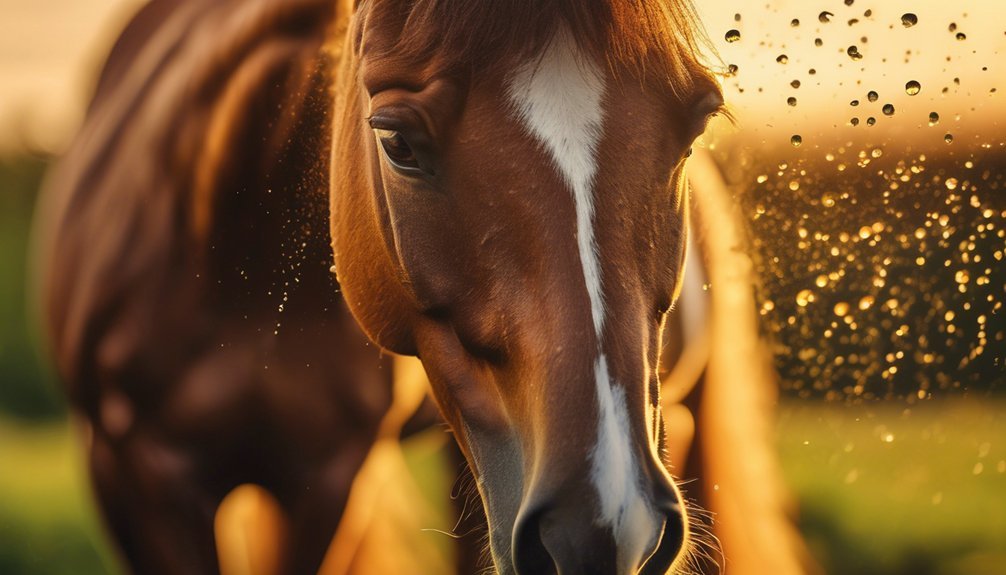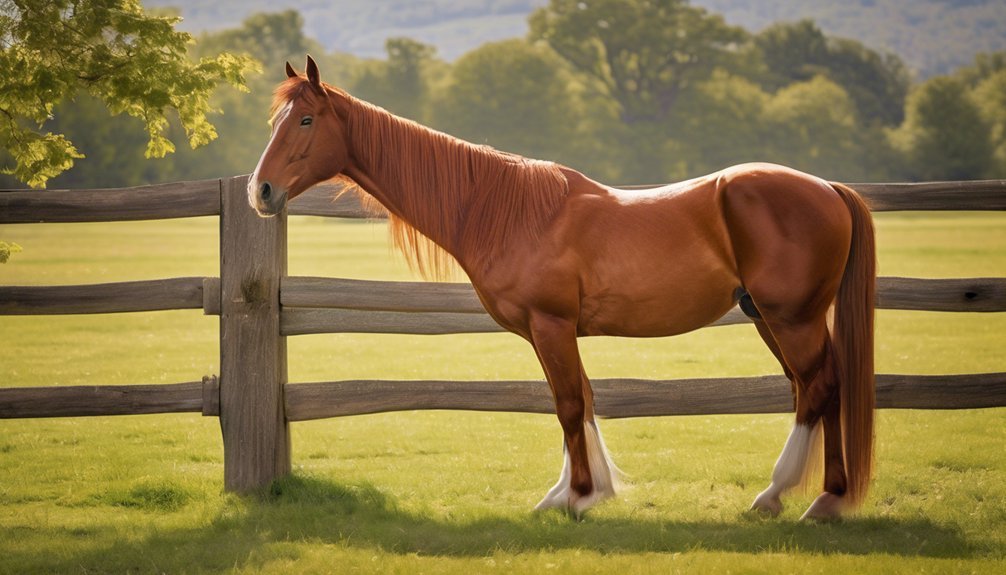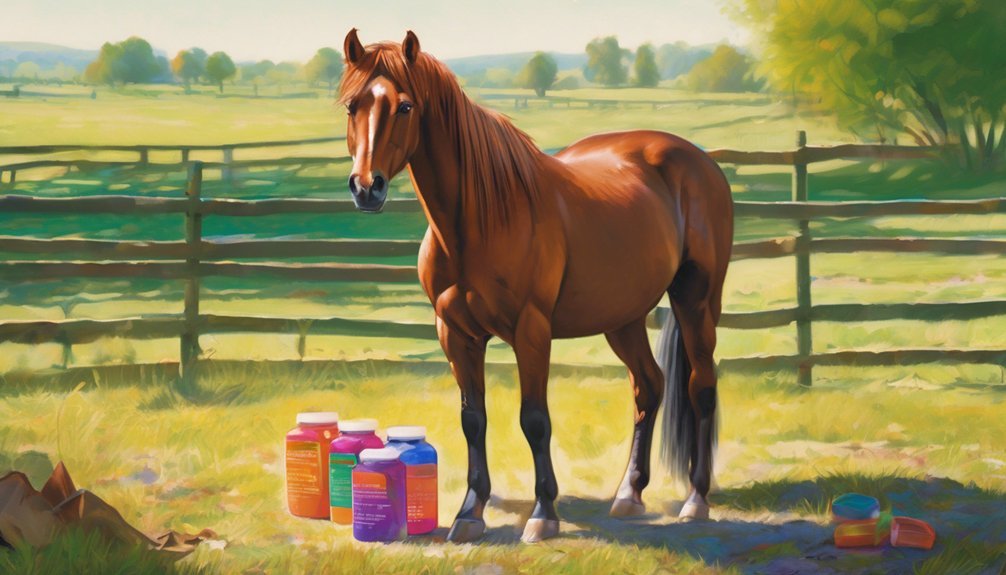
When it comes to maintaining your horse's coat health, supplements can play a pivotal role. They provide essential nutrients that not only enhance shine but also support skin integrity and hydration. Key components like omega fatty acids and biotin are particularly beneficial, yet it's crucial to tailor supplementation to your horse's specific needs. Understanding the right balance can prevent issues related to over-supplementation, but what are the most effective strategies for choosing the right products?
Key Takeaways
- Supplements provide essential nutrients like proteins, vitamins, and minerals that enhance coat texture and overall coat health in horses.
- Omega fatty acids, particularly omega-3 and omega-6, support skin hydration and reduce inflammation, contributing to a shiny coat.
- Antioxidants protect the skin from oxidative stress, preventing dullness and promoting a vibrant coat appearance.
- Over-supplementation poses risks, including nutrient imbalances and toxicity, making careful monitoring of intake crucial for horse health.
- Regular coat condition assessments and individual horse considerations help tailor supplement choices for optimal coat enhancement results.
Understanding Equine Coat Health

When you think about your horse's overall health, it's easy to overlook the significance of coat condition. The texture of your horse's coat can reveal much about its nutritional status and well-being.
Healthy coats are usually smooth, shiny, and resilient, while rough or dull coats may indicate deficiencies or stress. Seasonal changes also play a crucial role; for instance, horses often shed their winter coats in spring, making it vital to monitor their skin health during this transition.
Factors like hydration, diet, and grooming practices directly influence coat texture. Regularly assessing your horse's coat not only helps you gauge its health but also fosters a deeper connection between you and your equine companion, ensuring they receive the care they deserve.
The Importance of a Shiny Coat
Why is a shiny coat so crucial for your horse's overall health? A gleaming coat isn't just about aesthetics; it serves as an important coat health indicator.
A shiny coat reflects proper nutrition and effective grooming, showcasing your horse's overall vitality. It signifies that your horse's skin is well-hydrated and that its follicles are functioning optimally.
Additionally, shiny coat benefits extend beyond appearance; they can indicate a lack of parasites and good metabolic health. When your horse's coat shines, it suggests that internal systems, like digestion and circulation, are working harmoniously.
Prioritizing coat health contributes to your horse's well-being, allowing for a happier, more active life. Ultimately, a shiny coat is a testament to your care and commitment.
Key Nutrients for Coat Enhancement

Achieving and maintaining a shiny coat relies heavily on a balanced intake of key nutrients that directly influence hair health and skin condition.
Proteins, particularly amino acids like methionine and lysine, play a crucial role in strengthening coat texture and promoting vibrant color.
Biotin, a B-vitamin, is essential for keratin production, which contributes to hair resilience during seasonal shedding.
Essential minerals, such as zinc and copper, support skin integrity and help in the absorption of other nutrients, ensuring your horse's coat remains lustrous.
Additionally, antioxidants like vitamin E protect the skin from oxidative stress, enhancing overall coat appearance.
Omega Fatty Acids and Their Benefits
Though often overlooked, omega fatty acids are vital for promoting optimal coat health in horses. These essential fats, particularly omega-3 and omega-6 fatty acids, play a key role in maintaining skin hydration and reducing inflammation.
Omega sources like fish oil, flaxseed, and chia seeds provide these beneficial fats. By incorporating these supplements into your horse's diet, you can enhance their coat's shine and texture while preventing dryness and flakiness.
Omega-3 fatty acids, for example, are known for their anti-inflammatory properties, which can alleviate skin issues. On the other hand, omega-6 fatty acids support barrier function and overall skin health.
Prioritizing these fatty acid types can lead to a healthier, more vibrant coat for your beloved horse.
Biotin: The Beauty Vitamin for Horses

Biotin, often referred to as the "beauty vitamin," plays a crucial role in maintaining the health and appearance of your horse's coat, hooves, and skin. This essential B-vitamin enhances keratin production, leading to stronger hooves and a shiny coat. For optimal results, you should consider biotin sources such as alfalfa, oats, and specialized supplements. The recommended biotin dosage typically ranges from 15 to 30 mg per day, depending on your horse's individual needs.
| Biotin Sources | Biotin Dosage (mg/day) | Benefits |
|---|---|---|
| Alfalfa | 15-30 | Promotes coat shine |
| Oats | 15-30 | Strengthens hooves |
| Biotin Supplements | 15-30 | Supports skin health |
| Eggs | 15-30 | Enhances overall vitality |
| Fish Meal | 15-30 | Improves coat texture |
Antioxidants and Their Role in Coat Condition
While many horse owners focus on diet and grooming, antioxidants play a vital role in maintaining the health and luster of your horse's coat.
These powerful compounds combat oxidative stress, which can lead to dullness and poor coat condition. Common antioxidant sources include vitamins E and C, selenium, and various polyphenols found in fruits and vegetables.
By incorporating these nutrients into your horse's diet, you can help enhance their coat's shine and overall vitality. Antioxidants support skin health, reduce inflammation, and promote a more vibrant coat, making them essential for any horse owner's supplement strategy.
Consider adding high-quality, antioxidant-rich supplements to your horse's regimen for optimal results and a truly radiant coat.
Herbal Supplements for Coat Shine

When you want to enhance your horse's coat shine, herbal supplements can be a powerful addition to their diet.
Herbal remedies like flaxseed and alfalfa are rich in omega fatty acids, promoting moisture and shine in the coat. Additionally, you might consider using natural oils such as coconut or olive oil, which nourish the skin and enhance luster.
These oils can also help reduce dandruff and flakiness, creating a healthier environment for the hair follicles. Incorporating these herbal supplements not only supports your horse's appearance but also contributes to overall well-being.
Assessing Your Horse's Diet
How can you ensure your horse's diet supports optimal coat health? Start by evaluating the forage quality. High-quality forage provides essential nutrients that promote a healthy coat. Look for fresh, clean hay or pasture that contains a variety of grasses and legumes.
Next, focus on achieving a nutrient balance. Your horse needs adequate protein, essential fatty acids, and vitamins like A, E, and biotin for a shiny coat. Consider incorporating a well-formulated concentrate or specific supplements if you notice deficiencies.
Regularly assess your horse's body condition and coat condition to gauge the effectiveness of their diet. Remember, a balanced diet not only enhances coat health but also supports overall well-being, making your bond with your horse even stronger.
Potential Risks of Over-Supplementation

Although supplements can enhance your horse's coat health, over-supplementation poses significant risks that can undermine their well-being.
Administering excessive vitamins and minerals can lead to nutrient imbalance, causing more harm than good. For instance, too much vitamin A can lead to toxicity, while excess zinc can interfere with copper absorption, affecting overall health and coat condition.
These over-supplementation risks can manifest in symptoms like lethargy, skin irritations, or digestive issues. It's essential to monitor your horse's intake and consult with a veterinarian before introducing new supplements.
Striking the right balance ensures your horse receives the benefits without jeopardizing their health. Remember, quality matters more than quantity in supporting your horse's radiant coat.
Choosing the Right Supplement for Your Horse
Choosing the right supplement for your horse requires a careful assessment of their specific needs and overall diet.
Start by identifying supplement types that target coat health, like omega fatty acids, biotin, and zinc. Each of these plays a unique role; for instance, omega fatty acids promote moisture retention, while biotin supports keratin production.
Once you've selected a type, consult dosage recommendations based on your horse's weight and activity level. Remember, every horse is different, so what works for one mightn't suit another.
Regularly monitor their coat condition, and be ready to adjust as necessary. With patience and attention, you'll enhance your horse's coat health, reflecting their overall well-being and vitality.
Frequently Asked Questions
How Long Will It Take to See Coat Improvement With Supplements?
You'll typically see coat improvements within 4 to 8 weeks, depending on supplement absorption rates and your horse's unique coat condition timeline. Consistent use will maximize benefits, so patience is key during this process.
Can Supplements Replace a Balanced Diet for Coat Health?
Supplements can't replace a balanced diet. They enhance nutrient absorption, but without proper dietary balance, deficiencies can occur. Ensure your horse receives comprehensive nutrition for optimal coat health and overall well-being. Prioritize quality feed first.
Are There Specific Breeds That Benefit More From Coat Supplements?
Have you noticed how certain breeds boast more vibrant coat colors? Breeds like Arabians and Thoroughbreds often benefit from targeted supplements, enhancing their unique coat characteristics and maintaining overall coat health and shine.
Is It Safe to Combine Multiple Supplements for Coat Health?
It's generally safe to combine multiple supplements, but you should consider potential supplement interactions and dosage considerations. Always consult your vet to ensure optimal safety and effectiveness for your horse's health and coat condition.
How Do I Know if My Horse Needs Supplements for Its Coat?
To determine if your horse needs supplements for its coat, assess its coat condition. If it's dull or brittle, consider supplement types rich in omega fatty acids, vitamins, and minerals to enhance shine and overall health.
Conclusion
In summary, nurturing your horse's coat with the right supplements is like tending a garden; it flourishes with care and attention. By providing essential nutrients such as omega fatty acids and biotin, you cultivate a vibrant, healthy coat that reflects your horse's overall vitality. However, just as too much water can drown a plant, over-supplementation can lead to issues. Tailoring their diet to individual needs ensures a radiant coat, enhancing both beauty and performance in your equine partner.





